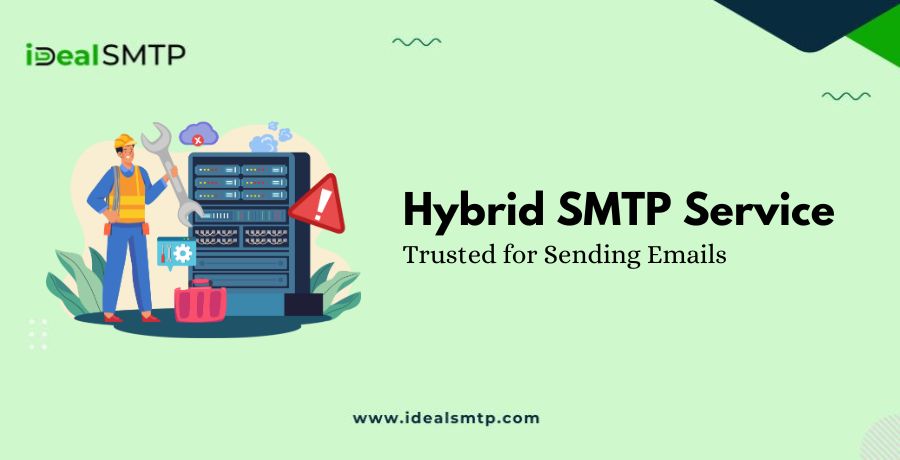Email has become an essential tool for personal and professional communication in today’s world. For organizations, maintaining efficient and dependable email delivery is vital. Hybrid SMTP services stand out as a flexible choice that combines the benefits of on-premises infrastructure with the flexibility of cloud-based services.

This combination enables businesses to optimize their email delivery, improve security, and effectively manage expenditures. In this article, we’ll look at what makes Hybrid SMTP services so revolutionary and why they’re quickly becoming the preferred option for enterprises of all sizes. Let’s get into the details!
Table of Contents
Pricing
| Trail Plan | Standard Plan | Premium Plan | Professional Plan |
| $50 | $145 | $185 | $225 |
| Sending Limit | Sending Limit | Sending Limit | Sending Limit |
| 1000 Emails/Hour | 1500 Emails/Hour | 3000 Emails/Hour | 5000 Emails/Hour |
Understanding Hybrid SMTP Solutions
Bulk Email Service Provider have a protocol which is used for sending and receiving emails over the internet. A Hybrid SMTP solution combines the benefits of both on-premises and cloud-based email delivery systems. It allows organizations to leverage their existing on-premises email infrastructure while taking advantage of cloud-based services for improved deliverability and scalability.
Advantages of Hybrid SMTP Services
Enhanced Deliverability and Reliability
Hybrid SMTP Service use a combination of on-premises infrastructure and cloud-based services to optimize email deliverability. By leveraging the expertise of reputable cloud service providers, organizations can overcome common deliverability challenges, such as spam filtering and IP reputation issues, resulting in improved email reach and reliability.
Scalability and Flexibility
With Hybrid SMTP Service, businesses can scale their email delivery capacity seamlessly. During peak periods or as the organization grows, cloud-based resources can be easily added to handle increased email traffic. This flexibility ensures that email delivery remains uninterrupted, even during high-volume periods.
Cost-Effectiveness
By adopting a hybrid SMTP solution, organizations can optimize their email infrastructure costs. Instead of investing heavily in expanding on-premises infrastructure, businesses can utilize cloud-based resources when needed, paying only for the resources consumed. This cost-effective approach allows organizations to allocate their resources more efficiently.
Robust Security Measures
Hybrid SMTP solutions incorporate advanced security measures to protect email communications. These solutions offer encryption protocols, spam filtering, virus scanning, and other security mechanisms to safeguard sensitive information. By leveraging the expertise of Bulk email services, organizations can benefit from industry-leading security practices.
Seamless Integration with Existing Infrastructure
One of the significant advantages of hybrid SMTP solutions is their compatibility with existing email infrastructure. Organizations can seamlessly integrate their on-premises email servers with Best SMTP Services, avoiding the need for complex migration processes. This integration ensures a smooth transition while preserving existing configurations and settings.
Key Features of the Best Hybrid SMTP Solution
To determine the best hybrid SMTP solution for your organization, it’s essential to consider the following key features:

Intelligent Routing and Load Balancing
An effective hybrid SMTP solution should include intelligent routing capabilities that analyze email traffic patterns and direct messages through the most optimal delivery path. Load balancing ensures that email traffic is evenly distributed across multiple servers, preventing bottlenecks and optimizing performance.
Comprehensive Reporting and Analytics
Detailed reporting and analytics are crucial for monitoring and optimizing email delivery performance. The best hybrid SMTP service should provide comprehensive insights into email deliverability, open rates, click-through rates, bounce rates, and other essential metrics. These insights help organizations make data-driven decisions to improve their email campaigns.
Advanced Authentication Mechanisms
To combat email fraud and maintain sender reputation, the best hybrid SMTP solution should support advanced authentication mechanisms such as SPF (Sender Policy Framework), DKIM (DomainKeys Identified Mail), and DMARC (Domain-based Message Authentication, Reporting, and Conformance). These authentication protocols ensure that emails are sent from legitimate sources and prevent phishing attacks.
Sender Reputation Management
Maintaining a good sender reputation is crucial for successful email delivery. The best hybrid SMTP solution incorporates sender reputation management features that monitor sender scores, identify potential issues, and provide recommendations for improving reputation. This proactive approach helps organizations maintain a positive reputation and maximize email deliverability.
Automated Bounce Handling and Feedback Loops
Efficient bounce handling is vital for maintaining a clean email list and optimizing future campaigns. The best hybrid SMTP solution automates bounce handling processes, categorizing bounces and providing actionable insights. Additionally, feedback loops allow organizations to receive notifications when recipients mark emails as spam, enabling them to take appropriate actions.
Choosing the Right Hybrid SMTP Service Provider
When selecting a hybrid SMTP service provider, consider the following factors:

Assessing Delivery Infrastructure
Ensure that the service provider operates a robust and reliable email delivery infrastructure. Look for providers that have strategically located data centers and a strong network of delivery servers to ensure optimal performance and global reach.
Evaluating Scalability and Performance
Check if the SMTP servers can scale email delivery resources based on your organization’s needs. Evaluate their infrastructure capacity, ability to handle high-volume sending, and the presence of load balancing mechanisms to ensure smooth and uninterrupted email delivery.
Analyzing Security Measures
Verify the security measures implemented by the service provider. Look for features like encryption, spam filtering, virus scanning, and DDoS protection to ensure the confidentiality and integrity of your email communications.
Considering Compliance Requirements
If your organization operates in a regulated industry, ensure that the hybrid SMTP service provider complies with industry-specific regulations such as HIPAA or GDPR. Check if they offer additional features like data encryption and audit logs to meet your compliance needs.
Reviewing Customer Support and Service Level Agreements
Reliable customer support is essential in case of any issues or concerns. Evaluate the service provider’s support options, response times, and availability. Additionally, review their service level agreements (SLAs) to understand the level of service guarantee they offer.
How Hybrid SMTP Service Boost Email Marketing Campaigns
Hybrid SMTP solutions offer significant advantages for email marketing campaigns. Let’s explore some key benefits:
Optimizing Deliverability Rates
By leveraging the advanced deliverability features of hybrid SMTP solutions, organizations can significantly improve their email deliverability rates. This translates to more emails reaching the recipients’ inboxes, increasing the chances of engagement and conversions.
Personalization and Segmentation
Hybrid SMTP solutions enable organizations to personalize email content and segment their audience effectively. By tailoring messages based on recipient preferences, behaviors, or demographics, businesses can deliver targeted and relevant content, enhancing the overall impact of their email marketing efforts.
A/B Testing and Performance Optimization
Testing different email variations is crucial for optimizing campaign performance. Hybrid SMTP solutions often provide A/B testing capabilities, allowing organizations to experiment with different subject lines, content layouts, or call-to-action buttons. This iterative approach helps identify the most effective elements for driving engagement and conversions.
Tracking and Analytics
With hybrid SMTP solutions, organizations gain access to comprehensive tracking and analytics features. They can monitor email open rates, click-through rates, conversions, and other metrics to gauge the effectiveness of their campaigns. This data-driven approach enables organizations to refine their strategies and make informed decisions to maximize results.
Do You Know How to do email marketing services for small business?
Integrations with CRM and Marketing Automation Tools
Integrating hybrid SMTP solutions with Customer Relationship Management (CRM) systems and marketing automation tools empowers organizations to streamline their email marketing workflows. Seamless data synchronization, automated triggers, and personalized email sequences can be set up to nurture leads and drive conversions effectively.
Conclusion
In today’s fast-paced digital landscape, having a reliable and efficient email delivery system is paramount for businesses. Hybrid SMTP solutions offer the best of both on-premises and cloud-based approaches, ensuring enhanced deliverability, scalability, cost-effectiveness, and security. By choosing the right hybrid SMTP service provider and leveraging the key features discussed in this article, organizations can optimize their email marketing campaigns and establish effective communication with their audience.







